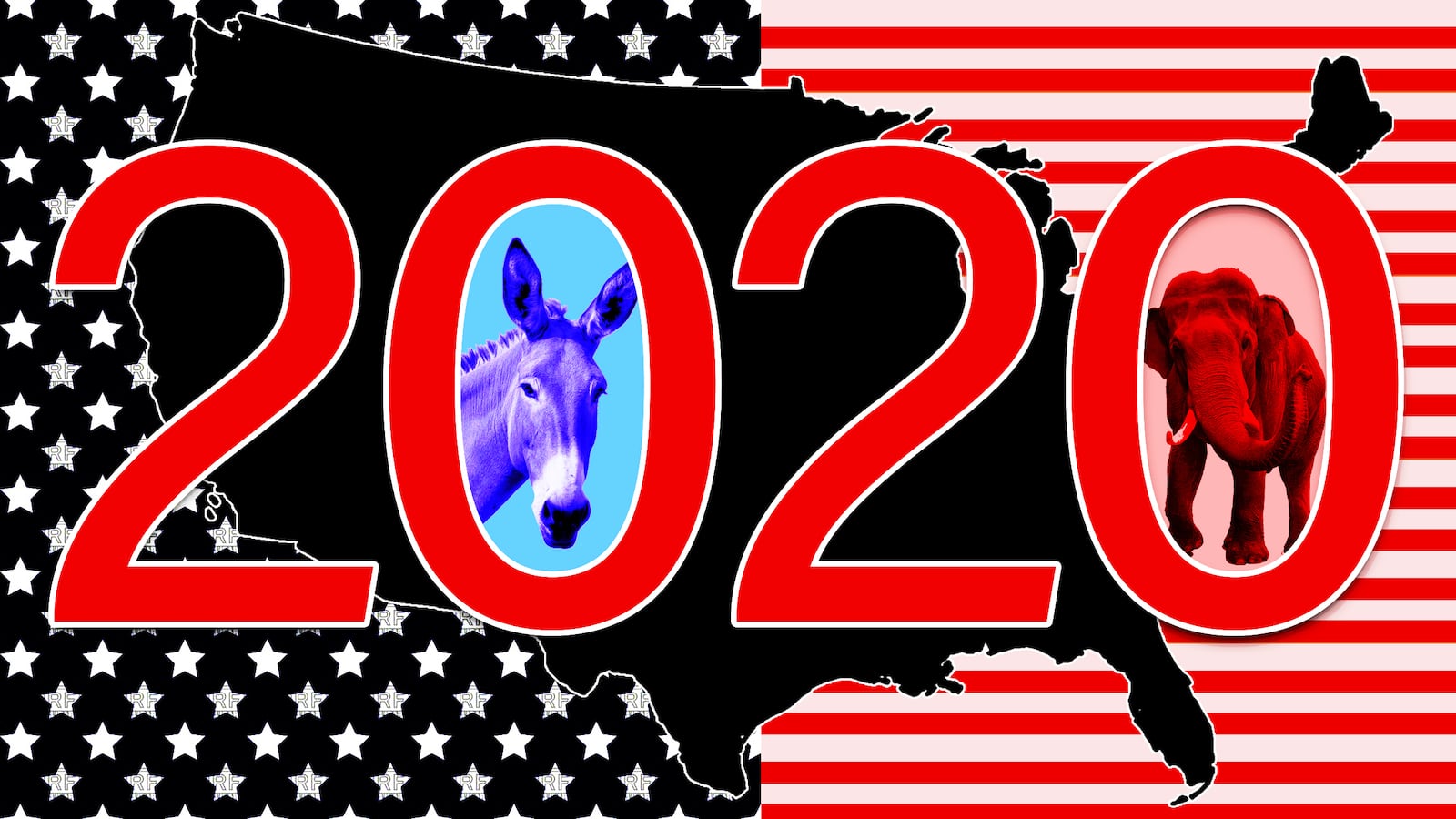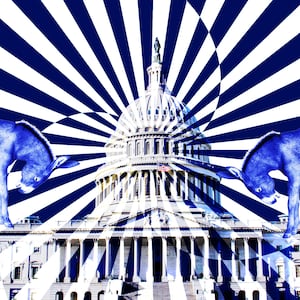The 2018 midterms were hugely significant on their own terms but they also serve as prologue for the Big Show: 2020, a presidential election as critical as any in American history. That’s why it’s not too early to start mulling over it.
Decent people around the world can hold out for another 24 months—especially with the check on President Trump now provided by a Democratic House. But six more years of exposure to Agent Orange should he win reelection would be a world-historical disaster.
As usual in midterms, the talk among pundits and political professionals turned to 2020 before Tuesday’s returns were even complete. With no front-runner on the horizon, the questions were urgent for Democrats and for the more than 30 possible candidates. What did we learn? Who do the results help? Who do they hurt?
We learned that a pink wave is underway and Democrats will likely need to put a woman somewhere on the ticket to keep it cresting. But we also saw that a coalition of women, minorities, and young voters is probably not enough to beat Trump as long as he and other Republicans continue to run up huge totals with non-college educated white men.
We learned that Democrats continue to get shellacked in exurban and rural areas, a big disadvantage not only in blood red states but in states like Ohio and Florida that are critical battlegrounds in the Electoral College. With the approval of Amendment 4 in Florida, Democrats got excited that more than a million felons there will be newly eligible to vote.
This will likely yield tens of thousands of new voters, but they will be dwarfed by the more than 300,000 people who move to Florida every year, many of them conservative “snowbirds” fleeing taxes in the North.
Finally, we learned that the route to victory in 2020 lies in Rust Belt states like Michigan, Wisconsin, Pennsylvania—which Trump won narrowly—and Ohio, where he crushed Hillary Clinton. The first three all elected Democratic governors this year, which will help bolster their state parties, and Ohio reelected Sen. Sherrod Brown by more than six points.
Brown—the gravelly-voiced free trade skeptic—was one of the hot names coming out of Tuesday. He sounded like a presidential candidate in his victory speech but so far has tamped down speculation that he might run. If he did, he would neutralize Trump’s advantage on trade, a huge plus, though he doesn’t seem to have the pugilistic skills to deal with the president.
Another “lunch bucket” Democrat who isn’t running but should think about it is Montana Sen. Jon Tester, who went head-to-head with Trump on the campaign trail this fall and prevailed. Tester, who sports a crew cut and lost three fingers in a meat grinder on his farm, managed to get reelected in a deep red state despite voting against the nominations of both Neil Gorsuch and Brett Kavanaugh for the Supreme Court. Trump’s Alpha Male act doesn’t work on him. Montana’s governor, Steve Bullock, who is considering a campaign, might also cut Trump’s margins in rural and exurban counties.
One pleasant surprise about 2018 was that high-quality Democratic candidates and focused voters seemed to realize that this is no time for vicious party in-fighting or ideological purity tests. They’re all Vince Lombardi Democrats now. Lombardi, legendary coach of the Green Bay Packers, said: “Winning isn’t everything; it’s the only thing.”
This mood doesn’t bode well for Massachusetts Sen. Elizabeth Warren, also handily reelected, but the only Democratic hopeful who isn’t well ahead of Trump in current head-to-head match-ups. (They’re in a statistical tie). To win the nomination, Warren will have to change that.
Sen. Bernie Sanders, the winner by near-acclamation in Vermont, does better right now against Trump. But do Democrats really want to risk a replay of 1972, when a popular liberal senator and war hero, George McGovern, ran against a despised president, Richard Nixon, and lost 49 states? That thumping wouldn’t happen to Sanders. He wouldn’t lose 49 states, but it’s hard to see why sensible Democrats would risk ensuring four more years of Trump by nominating a self-described socialist.
Age is a factor. The last three successful Democratic presidential nominees (Jimmy Carter, Bill Clinton and Barack Obama) were all hopeful young candidates with their eye on the future. In the House races, generational change was a big theme. Americans seem ready, as Obama put it in running against Hillary Clinton and John McCain in 2008, to “turn the page.”
If so, that won’t help Joe Biden, who will be 78 in 2020. Biden seems strong in the states Democrats need, but he proved an inept candidate in 1988 and 2008. The most intriguing gambit for him would be to pledge to serve only one term and choose his intended running mate during the primaries. Hillary Clinton, about to embark on a speaking tour, and John Kerry would each run in a heartbeat if there was a groundswell for them. There won’t be.
Andrew Gillum and Stacey Abrams may have fallen short of expectations, but Tuesday’s returns suggest a hunger for fresh, inspiring faces. That could help New Jersey Sen. Cory Booker, who is rousing Democratic audiences but may lack the seasoning to win. His “I am Spartacus” moment in the Kavanaugh hearings didn’t go over well, and Iowa voters won’t like that he’s a vegan.
It’s hard to see California Sen. Kamala Harris, a former prosecutor, winning anywhere Hillary didn’t, but she could be a formidable candidate in a party with the interests of women and African-Americans at its core.
Newly reelected New York Sen. Kirsten Gillibrand is running hard to be the candidate of women, but she may have overplayed her hand in leading the charge for Al Franken to resign from the Senate. Lots of Democrats are still sore about that.
Minnesota Sen. Amy Klobuchar, also a former prosecutor (a good résumé entry in politics), was reelected with 60 percent of the vote and even did decently in the far-north Iron Range, which is strongly pro-Trump. Klobuchar is impressive and wry on the stump, though it’s not clear if she can clear the bar as an inspirational speaker.
Rep. Beto O’Rourke can. For all the Monday-morning quarterbacking about his narrow loss to Sen. Ted Cruz, plenty of Democrats want him to run for president, just as Abraham Lincoln did in 1860 after losing a contest for the Senate two years earlier. O’Rourke, a cross between Obama and Bobby Kennedy on the trail, is apparently more likely to run in 2020 for the Senate seat being vacated by John Cornyn.
Reps. Tulsi Gabbard, Seth Moulton, Tim Ryan, and Eric Swalwell are possibly interested--and Rep. John Delaney has already announced and decamped for Iowa-- but it’s a long leap from the House to the White House. Same goes for the journey from city hall for Mayors Eric Garcetti, Mitch Landrieu, and Pete Buttigieg, or from the Cabinet for Eric Holder and Julian Castro. Michael Bloomberg, who can self-finance, might have a better shot, especially if liberal candidates split the progressive vote. Starbucks CEO Howard Shultz and hedge fund manager Tom Steyer would have less to run on. And Michael Avenatti, with his sketchy past, has been grossly over-covered.
Democrats don’t want their own Trump; they want someone who can own Trump—with the gravitas of a real president. That could be a governor like John Hickenlooper of Colorado, Jay Inslee of Washington State, Terry McAuliffe of Virginia (Bill Clinton’s favorite), or Deval Patrick of Massachusetts (said to be Obama’s favorite), all of whom could run on strong records and distance from toxic Washington.
In 1974, two years before he became president, outgoing Georgia Gov. Jimmy Carter didn’t even make the list of the top 30 prospects for 1976. But by that point, Carter had already been quietly planning his campaign for 18 months. And he had a post-Watergate message—“I’ll never lie to you”—perfectly suited to the times.
In a wide-open field, the best-prepared candidate with the most resonant message might not win. There are a hundred ways to fail in presidential politics. But we’ll know by early next year which candidates are throwing heat in the most important election of our lifetimes.







